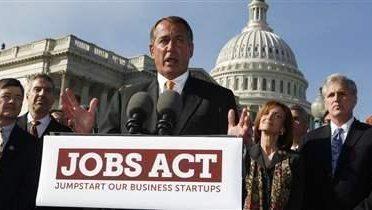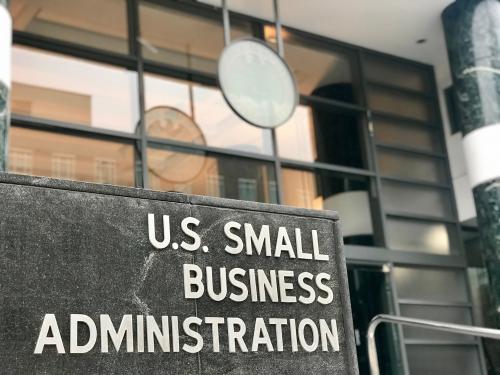President Obama is about to sign into law the JOBS Act-short for “Jumpstart Our Business Startups.” This Act won bipartisan support because it reduces the regulatory burdens on capital raising by small businesses. However, many of the Act’s provisions leave investors too vulnerable to significant risks that they do not understand.
The JOBS Act addresses three distinctly different types of companies: true startups, “small” companies going public and private companies of all sizes. For true startups, the JOBS Act offers the prospect of “crowdfunding”-the solicitation of relatively small amounts of capital from a large number of contributors, usually via the Internet.
Crowdfunding could open up a host of exciting new possibilities for small businesses. For instance, a mom-and-pop restaurant could use crowdfunding to finance the opening of a second location. Or an online retailer could solicit contributions to help purchase new servers to accommodate increasing web traffic.
Although the House bill broadly exempted crowdfunding from the securities laws, a bipartisan amendment in the Senate provided some regulatory protections to investors. The amendment mandated that companies disclose basic financial information before seeking crowdfunding, and required third-party intermediaries (i.e., websites selling crowdfunding shares) to register with the SEC. The amendment also reduced the amount of money that an individual could invest in a crowdfunded venture-preventing investors from assuming too much risk.
With this increased oversight, crowdfunding could fill a useful niche to help certain small businesses raise capital. Nonetheless, crowdfunding is very much an experiment; it might spawn a new generation of Internet fraudsters. Therefore, Congress should hold hearings every year or so to examine how the market has responded to the new Act.
For “small” companies, the Act decreases the regulatory burdens associated with going public. In the registration statement for the IPO, certain companies will only need two years of audited financial statements (instead of three). Furthermore, once these companies complete their IPO, they’d be exempt from various requirements of public companies for up to five years-such as mandatory “say-on-pay” advisory votes and auditor attestation of internal controls.
While these regulatory exemptions may have an adverse effect on the corporate governance of small companies, I don’t believe that these reforms will greatly increase the risk of serious fraud or deception. Even with the regulatory exemptions in the JOBS Act, investors will receive better disclosures than they would have received if the company had stayed private.
However, the exemptions in the JOBS Act apply to many companies that should not be considered “small”-including many companies earning nearly $1 billion in annual revenue. In effect, the JOBS Act’s definition of a “small” company covers the vast majority of U.S. companies that go public.
In my view, a company with $800 or $900 million of annual revenues should not be considered “small.” A more appropriate metric would be annual revenues of $250-$350 million. That is the definition of a small company developed by the SEC’s special task force on the subject.
The most problematic part of the JOBS Act relates to private companies: those too large to make much use of crowdfunding, but unwilling to sell shares in an IPO. The JOBS Act lets many of these private companies avoid public disclosures entirely.
Currently, any company with 500 or more shareholders must make periodic financial reports to the SEC. The JOBS Act will quadruple this limit from 500 to 2,000, and will exclude most employee shareholders from the count. This increase will let companies stay private even as they grow quite large, decreasing the amount of information available to investors. Without these regular reports, company shareholders would have a difficult time valuing their stock or holding management accountable.
Furthermore, the JOBS Act would allow these private issuers to cast a wider net when searching for investors. While they would still be required to limit their offerings to “accredited” (i.e., relatively wealthy) investors, the JOBS Act repeals the eighty-year-old ban against advertising to the general public-on TV, billboards, the Internet, and so forth.
Such a repeal will make it much more difficult for the SEC to combat fraud. Under current rules, fraudsters avoid using the Internet or other media to solicit investors for private offerings, since such widespread offerings would immediately attract the attention of the SEC’s enforcement division. By contrast, without the ban on general advertising, the SEC would have to investigate each online solicitation to determine whether the private company was illegally permitting non-accredited investors to purchase shares.
Currently, to be “accredited”, an investor must earn $200,000 annually ($300,000 for married couples) or have a net worth of at least $1 million (excluding their primary residence). Back in 1982, when this threshold was established, only 1.6% of American households qualified. Today, more than four times as many households meet this standard. The SEC should update the definition of “accredited”-say, to an income of $600,000 or a net worth of $3,000,000 (again excluding their primary residence) -to make sure that all investors in private offerings are financially savvy enough to understand what they’re buying and sufficiently wealthy to bear the substantial risk.
In short, the JOBS Act may help certain small businesses raise capital with fewer regulatory restrictions. But if these regulatory exemptions are exploited by the Bernie Madoffs of the world, investors may become more fearful of buying shares in any small business-making it harder for legitimate small businesses to raise capital. Therefore, over the next several years, the SEC should carefully monitor the actual effects of the Act – both positive and negative.
The Brookings Institution is committed to quality, independence, and impact.
We are supported by a diverse array of funders. In line with our values and policies, each Brookings publication represents the sole views of its author(s).








Commentary
Op-edJOBS Act: Jumpstarting Business or Bilking Investors?
April 3, 2012